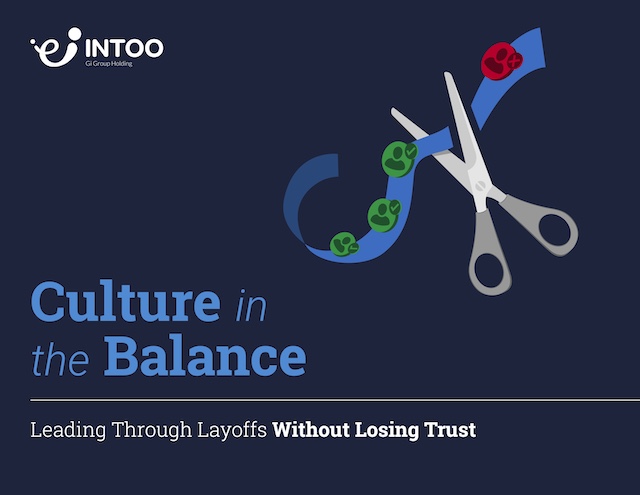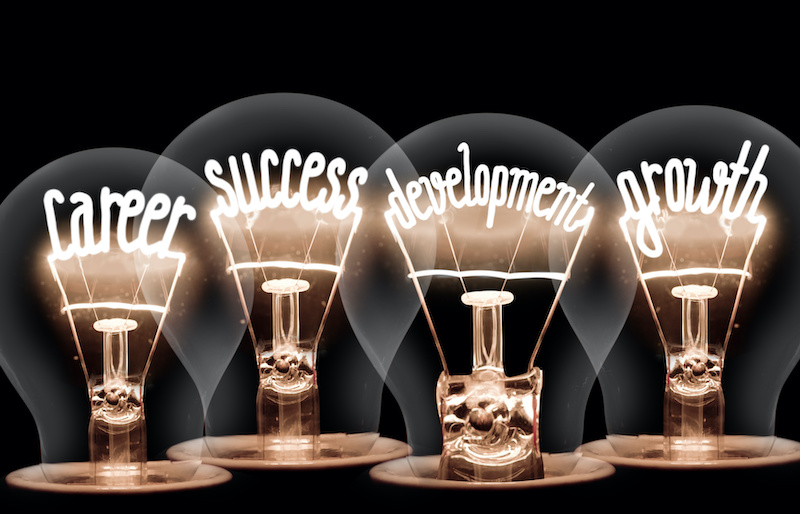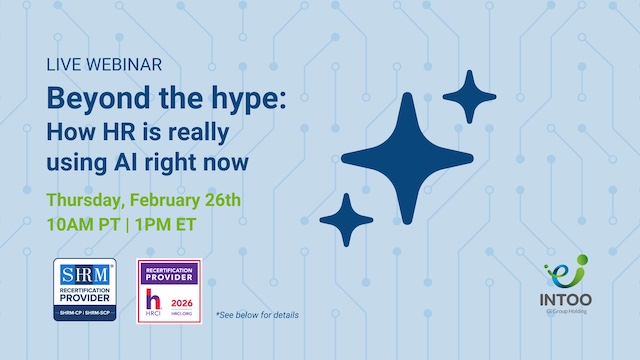INTOO announced September 16 the publication of its Culture in the Balance: Leading Through Layoffs Without Losing Trust report: a summary of findings from a new global survey that explores how companies can mitigate the negative impact of layoffs to preserve their culture and brand integrity.
In partnership with research firm Workplace Intelligence, INTOO surveyed 1,100 HR leaders and 1,100 full-time employees in Argentina, Brazil, Italy, the United Kingdom, and the United States. The report describes the challenges that both employees and HR leaders face before, during, and after layoffs—including a perceived lack of empathy from senior leadership.
Key findings include:
Employees are bracing for layoffs but aren’t prepared to weather them:
- 53% of employees are worried about getting laid off in the next 12 months.
- 91% say they aren’t prepared to look for a new job, and 54% could only support themselves and their family for three months if they were laid off.
- 58% of HR leaders admit their company doesn’t provide enough support to employees during layoffs.
Employees feel layoffs are being mishandled, but HR leaders doesn’t recognize this:
- 60% of employees feel their leaders lack empathy towards workers who get laid off.
- 54% don’t trust their company’s leadership team to handle layoffs compassionately and ethically.
- While 77% of HR leaders say their company strives to be exceedingly fair during layoffs, 33% of employees say their employer did as little as possible to ensure fairness.
Layoffs take a major toll on employees who are left behind:
- 80% of employees say companies underestimate the impact layoffs have on their remaining workforce.
- 71% would begin job hunting immediately after a layoff, even if they were spared.
- 62% of employees say they lost trust in their employer following layoffs.
Poorly handled layoffs can fuel backlash and long-term reputational harm:
- Almost 1 in 5 employees—and around 1 in 4 Gen Z employees—would complain online if they were let go.
- Almost half of companies have experienced retaliation on social media after layoffs.
- 71% of employees would never again work for the company that laid them off.
A better path forward: Offering outplacement services helps employees land on their feet after layoffs—and protects an employer’s reputation.
The survey also explored how companies can improve the layoff experience for employees. One of the most important ways employers can show their support is by offering outplacement services, which can include resume reviews, career coaching, and interview preparation. While the vast majority of respondents—88% of HR leaders and 86% of employees—believe these services should be offered to laid-off employees, access to outplacement support varies widely.
“Globally, around a third of HR leaders say their company includes outplacement services as part of its layoff package,” said Dan Schawbel, Managing Partner, Workplace Intelligence. “But in Brazil, that number jumps to 48%, and more than 4 out of 10 companies in the U.S. and the UK offer these services.”
“Awareness of these services is also lacking,” adds Schawbel. “Only 18% of employees are aware of outplacement programs offered by their employer, highlighting a clear opportunity for employers to improve communication about these benefits.”
“Layoffs are difficult, even when handled with the best intentions,” said Mira Greenland, Chief Revenue Officer at INTOO. “But the reality is that many companies are falling short—58% of HR leaders acknowledge their organizations aren’t providing adequate support to employees impacted by layoffs.”
Greenland emphasized the broader organizational risks, noting: “It’s critical for companies to consider the ripple effects layoffs have on the remaining workforce. When 71% of layoff survivors start job hunting and 62% report a loss of trust, employers risk prolonged instability. These outcomes are preventable with more thoughtful and compassionate execution of workforce reductions.”
To learn more about the research, read the full report: Culture in the Balance: Leading Through Layoffs Without Losing Trust.
Methodology
Research findings are based on a survey conducted by INTOO and Workplace Intelligence between March 18 and April 3, 2025. In total, 2,200 global employees between the ages of 21 – 67 completed the survey. This included 1,100 employees and 1,100 HR leaders.
The survey sampled employees from all generations, and an even mix of male and female respondents across both audiences.
Robyn Kern is a seasoned business writer who has written in the HR, education, technology, and nonprofit spaces. She writes about topics including outplacement, layoffs, career development, internal mobility, candidate experience, succession planning, talent acquisition, and more, with the goal of surfacing workforce trends and educating the HR community on these key topics. Her work has been featured on hrforhr.org and trainingindustry.com.











